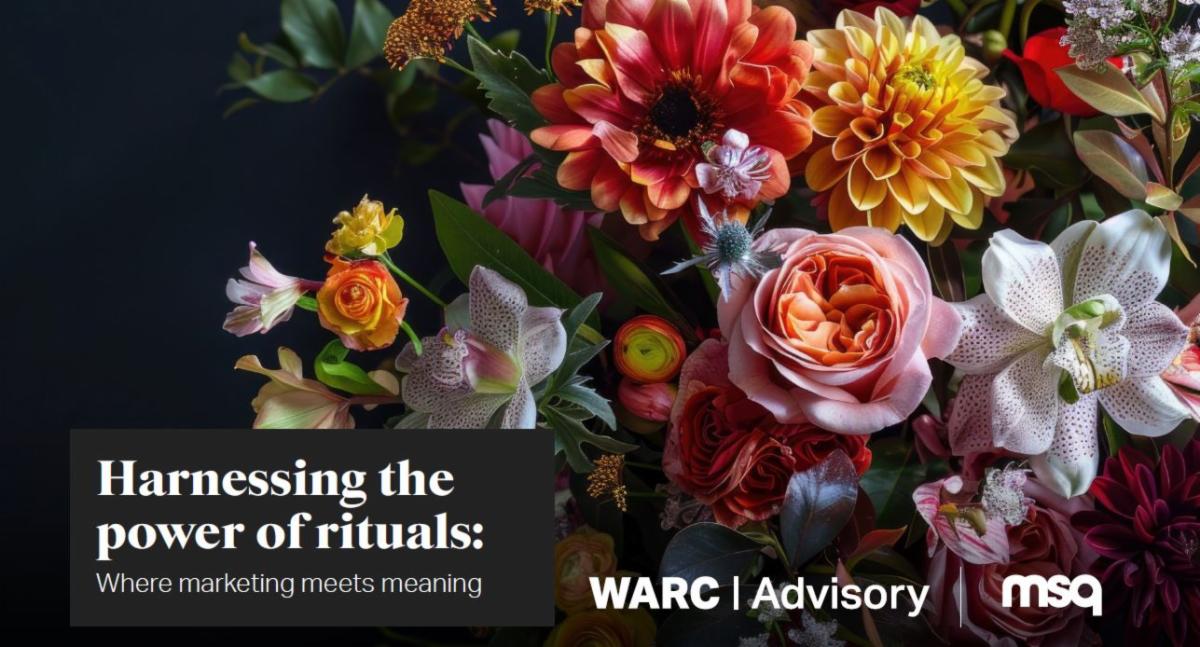Rituals unlock access to consumers’ deep emotional behaviours to support meaningful brand-building
Breakthrough research by WARC Advisory and MSQ presented in new whitepaper: ‘Harnessing the power of rituals: Where marketing meets meaning’
72% of consumers incorporate brands into their rituals at least some of the time, and 39% feel more positively toward brands that become a part of ritual
Rituals are driven by personal meaning even when providing practical benefit: 44% of rituals are centred around daily routine, 25% around self care. For 33% rituals provide structure, escape (32%) and control (31%)
WARC Advisory and creative, technology and media group, MSQ have released a whitepaper today, Harnessing the power of rituals: Where marketing meets meaning.
This breakthrough research examines the role of rituals in consumers’ lives, how people participate in them and why, and explores the potential opportunities that brands can unlock: 72% of consumers surveyed incorporate brands into their rituals at least some of the time, 70% are very, or somewhat, open to adopting new rituals, and 39% feel more positively toward brands that become a part of rituals, the report finds.
As brands battle to connect more meaningfully with consumers, the report outlines how rituals – defined as a succession of behaviours designed to induce an emotional transformation – can enrich understanding of consumer behaviours, unlocking access to more meaningful brand building. This allows brands to unleash deeper connections and generate longer relationships. The whitepaper outlines marketing opportunities through engaging in rituals.
The analysis combines a WARC Advisory survey of 4000 consumers across Germany, France, UK and the US, and in-depth expert interviews with marketers, culture experts, behavioural scientists and neuroscientists including: Dr. Marcus Collins, Professor at the Ross School of Business, University of Michigan, Author of For the Culture; and Sian Davies Global Founder, The Behavioural Architects.
In addition, through utilising its Texture tool to analyse over 688,000 social media data sources and 200 million search data points, Freemavens (an MSQ agency) has unearthed eight ritual types that show a range of individualised and collective behaviours within three specific categories – Personal Care, Alcoholic Beverages, Finances – outlined within the report: Security, Maintenance, Celebration, Identity, Commencement, Connection, Enhancement and Calming.
Kate Howe, Executive Director, MSQ, said: “This whitepaper reveals that rituals offer more than just a glimpse into consumer behaviour—they provide a roadmap to creating long-lasting brand relationships. By understanding the emotional transformations that rituals are designed to induce, brands can align their strategies to resonate more deeply with consumers’ emotional needs.”
Imaad Ahmed, Head of Advisory, EMEA & Americas, WARC, commented: “Our research found that seventy two percent of consumers incorporate a specific brand into their rituals for reasons of familiarity, better experiences and convenience. Brands who actively observe customer behaviour, facilitate enhanced ritual experiences when customers allow, and participate in those rituals as much or as little as the customer chooses, tend to win. Brands grow in emotional value to consumers if they become part of their rituals. By growing a brand’s emotional value, marketing meets meaning.”
The whitepaper provides a set of guiding principles on rituals to help marketers identify and understand their role in consumers lives:
Principle 1. Rituals are driven by personal meaning even when providing practical benefit
One in four people surveyed say that, “creating the rules or beliefs for living my life” best describes the impact of their rituals, and nearly the same number agree that “rituals give my life purpose and meaning.” Rituals are most often connected to mindfulness and self-care, the report finds.
Principle 2. Rituals offer support for the individual in an atomised society
Rituals are often thought of as something that individuals do to connect to others and create a sense of community, whether through religion, culture, sports, or other shared experiences. While those rituals are just as important today, the data showed how often rituals are used to support the individual. 56% of rituals centre around personal care, or deepening connections with others. Beyond being concentrated in our daily routines, these rituals are focused on nurturing self and relationships. The research finds that rituals are most often carried out inside the home, and twice as often individually, than with friends or family. Also 50% of consumers surveyed involve others in their rituals at least some of the time.
3. Rituals provide structure and control in a volatile environment
One of the core functions of rituals is to provide a stabilising mechanism to counteract the forces which may create an individual’s sense of losing control. Of those surveyed, structure (33%), escape (32%) and control (31%) were the top three benefits of rituals.
4. Rituals create meaning in a world obsessed with efficiency
In a technology-driven culture that is hyper-focused on efficiency, people’s lives are more efficient than ever, resulting in a struggle to achieve a balance with mental and physical health, and overall happiness. In marketing, efficiency is by no means a bad thing. However, meaning and emotion in marketing messages and customer experience can often be lost in the quest for endless automation and efficiency. Rituals can enhance experiences and help to create rules and beliefs in people’s lives, the analysis finds.
Alongside presenting key insights, the whitepaper explores key macro forces and trends that are shaping rituals: Declining faith in institutions, influence of social media on ritual discovery and sharing, shifting priorities in the post-pandemic economy, and new rituals forming across generational divides.
While marketing campaigns built entirely around rituals are rare, the report provides case studies of brands that have optimised ritual behaviour to solve a business challenge, from KFC to The Guardian. The study also offers actionable insights for brands wanting to tap into the power of rituals.
